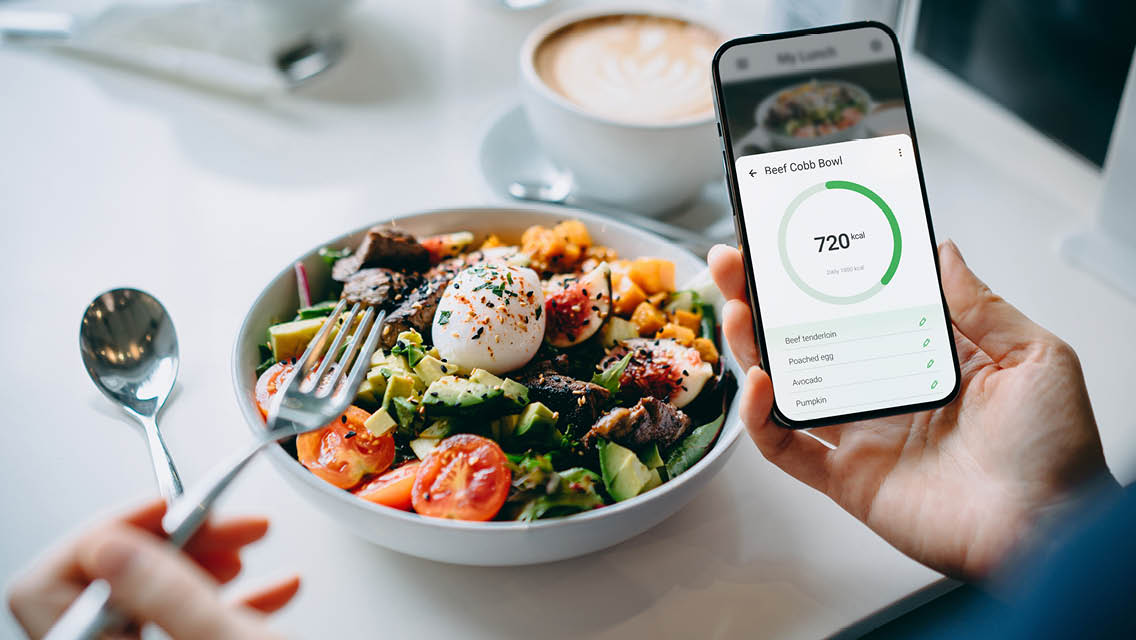For a lot of people trying to lose weight, counting is comforting. Numbers define guidelines, goals, and success — and there are oh-so-many ways to measure the weight-loss potential of food: points, calories, grams, serving sizes.
But there is a different school of thought that looks beyond the numbers and toward a more holistic approach to eating, one that views food in terms of its effect on the broader health and balance of your whole body. And yes, this approach can help you find your way to a healthier weight, too.
“If losing weight and maintaining a healthy weight were as simple as counting, we’d be a nation of skinny minnies,” says Marcelle Pick, MSN, OB/GYN, NP, author of The Core Balance Diet.
Pick and other integrative-health practitioners advise paying close attention to how you feel instead of obsessing about numbers. “If you feel lethargic, moody, and sick most of the time, there is a good chance something is biochemically broken,” she notes. “No amount of counting grams of fat, protein, or sugar will help you lose weight until you identify and resolve the underlying health issue.”
In fact, evaluating your food strictly by numbers rather than by its nutritional and metabolic merits is not only ineffective, but it may actually lead to weight gain.
We talked to top nutritionists and integrative physicians about the factors that have the greatest effect on your ability to achieve and maintain a healthy body weight. Here is their take on the five priorities that make a difference.
1. Reduce Inflammation
Chronic systemic inflammation is your body’s misdirected immune response that can lead to high cholesterol, heart disease, type 2 diabetes, and more. A side effect of inflammation in your gastrointestinal system, or gut, is often weight gain. If you regularly drink alcohol, pop painkillers or antibiotics, eat processed foods, or have an autoimmune disease, your gut may well be inflamed.
When the gut becomes inflamed, calcium and sodium enter surrounding cells, which causes them to attract and hold water. Think of how a speck of dirt makes your eyes water. Now imagine your body drawing water into the tissue around your gut as it tries to flush toxins.
“The extra water causes bloating and lowers the function of the cells’ energy centers, or mitochondria, making the body feel sluggish,” explains Elson Haas, MD, founder and director of the Preventive Medical Center of Marin in San Rafael, Calif., and author of Staying Healthy With New Medicine.
The biggest culprit behind inflammation-related weight gain is processed foods. Ironically, most reduced-calorie and “diet” foods stoke the fire.
You don’t only feel heavy — you look it. Haas calls this tissue swelling and abdominal bloating “false fat.” The bulge might appear to be 10 to 25 pounds of excess fat, but it’s not “true fat” (also called adipose tissue). It’s water-logged tissue, he says, “and it’s almost never corrected by conventional weight-loss diets.”
The biggest culprit behind inflammation-related weight gain is processed foods. Ironically, most reduced-calorie and “diet” foods stoke the fire.
“So many food products presented as a means of weight control are highly refined and full of chemicals that the body doesn’t recognize,” says Annie Kay, MS, RD, author of Every Bite Is Divine. “The standard American weight-loss menu is a diet soda and a frozen, low-calorie entrée,” she says. “It’s an inflammatory nightmare.”
You can reverse inflammation by eating nutritious whole foods and reducing or eliminating processed and packaged foods. As inflammation calms, the body often recalibrates to a healthy weight. Specific foods that fight inflammation include onions, turmeric, red grapes, and green tea, as well as berries, dark leafy greens, and coldwater fish.
2. Balance Your Blood Sugar
Simple carbohydrates are a bigger factor than calories in driving weight gain for most people. This is because they lack nutrients — namely fiber and protein — that slow digestion and balance blood sugar. “The refining process strips grains and natural sugars of their chewier, more nutrient-dense casings and leaves a simple carbohydrate chain that the body mainlines as glucose,” explains Pick.
When glucose enters the body quickly, blood sugar soars. In a scramble to balance the load, the pancreas shoots out insulin, the body’s fat-storage hormone. Blood sugar momentarily stabilizes, but insulin is overproduced, energy levels fall, and hunger returns. When we reach for another simple-carbohydrate-based snack, the cycle begins anew. Long-term consequences include weight gain and insulin-related metabolic syndrome, which sets the stage for diseases like type 2 diabetes.
To even out your blood sugar and maintain a healthy weight, eat plenty of nutritious proteins, fats, and fiber-rich vegetables, and reduce your intake of sugar and refined grains. Avoid all sodas, including diet sodas. The intense sweetness of artificial sugars can fool the body into releasing insulin, says Jacob Teitelbaum, MD, author of The Complete Guide to Beating Sugar Addiction.
Teitelbaum recommends nutrient-dense snacks and small meals to stave off sugar cravings. A half-cup serving of nuts, for example, can help keep the carb munchies at bay without weight-gain concerns. “At that pace, you don’t have to worry about the calories,” he says, noting that 2 to 4 ounces of high-quality nuts per day may also lower “bad” cholesterol.
3. Heal Your Microbiome
Ultimately, you can’t maintain a healthy weight without cultivating a healthy microbiome — the trillions of bacteria, yeasts, and fungi housed in your gut. That’s because a healthy gut is a cool gut, and a cool gut digests and metabolizes food efficiently.
To heal an inflamed gut and build a welcoming home for health-supporting microbes, start by targeting bad bacteria. Identify and curtail foods that you may have an intolerance to — common culprits include dairy and grains containing gluten. Signs of intolerance or sensitivity include belching, diarrhea, gas, fatigue, and irritability. (The best way to identify food sensitivities and intolerances is to do an elimination diet; see ELmag.com/ifmdetox.)
Next, reduce your intake of nutrient-poor processed foods, including crackers, chips, baked goods, and some breads, as well as fast foods, sweets, and anything containing artificial ingredients and preservatives — all of which can disrupt gut flora. Most processed foods are also packed with oils high in low-quality omega-6 fatty acids, which fan inflammation.
Cultivate friendly flora and fauna by diversifying your diet. Eat a variety of whole foods, including all types of berries, dark greens, nonstarchy vegetables, and legumes.
Finally, cultivate friendly flora and fauna by diversifying your diet. Eat a variety of whole foods, including all types of berries, dark greens, nonstarchy vegetables, and legumes.
Liz Lipski, PhD, a certified nutrition specialist and author of Digestive Wellness, recommends up to two daily servings of cultured and fermented foods, such as yogurt, kefir, sauerkraut, kimchi, and miso. All are natural sources of probiotics, enzymes, and prebiotics (soluble fibers that feed good probiotic microbes).
A high-quality probiotic supplement can help, but it’s not the same as eating fermented foods. “Historically, people have gotten their probiotics from food,” Lipski says. “It’s the life in foods that gives us life.”
(For more on building microbiome health, see “Build Your Microbiome“.)
4. Boost Your Mood
Depression and weight gain often go hand in hand — many antidepressant medications themselves can lead to extra pounds. Plus, the lower your mood, the more likely you are to succumb to cravings for food heavy in starches and processed carbs, such as pasta.
What your body may actually need is a shot of serotonin, the brain’s happiness chemical. Many people, and women in particular, experience significant carbohydrate cravings when they are deficient in this neurotransmitter, says Pick. Ninety-five percent of the body’s serotonin is stored in the gut, so the happier your gut, the better your odds of a good serotonin supply.
Because serotonin is made of amino acids, the building blocks of protein, you’ll want to emphasize healthy proteins in your diet.
Because serotonin is made of amino acids, the building blocks of protein, you’ll want to emphasize healthy proteins in your diet. The most important amino acid for making serotonin is tryptophan; numerous studies link mild to moderate depression and restless sleep with tryptophan deficiency. The body can’t manufacture tryptophan on its own, so you have to get it from your diet; top sources include milk, soybeans, cashews, and poultry.
More broadly, eating packaged and processed food can lead to nutrient deficiencies that tank both your mood and your metabolism.
“Mood is one of the first places nutrient deficiency shows up,” says Lipski. “Processed foods give our bodies information that says, ‘Be sluggish. Be in a bad mood.’ Wholesome foods make your moods more vibrant and help you feel more alive.”
5. Tame Stress With Relaxation
If you eat well and exercise but still can’t lose the weight, your hormones may be unbalanced. When people hear the word “hormone,” they tend to think of estrogen and testosterone, says Pick, but those are minor players. In truth, the body’s major hormones are insulin and cortisol.
As mentioned earlier, insulin’s job is to transport sugar from your bloodstream to your cells. “Food controls insulin, so what you eat has a huge impact on your hormones,” Pick says. Keep insulin balanced by eating regular, small, nutrient-dense meals.
Balancing cortisol, the stress hormone, is also vital to maintaining a healthy weight. Like most of your hormones, cortisol is made from cholesterol. When you’re stressed, your body makes extra cortisol to help it overcome a challenge — real or perceived — but your cholesterol supply doesn’t change. Your body has to divert cholesterol away from making hormones that keep your metabolism running strong. “That’s called the cortisol steal,” says Pick. In short, stress bogs down your metabolism.
The causes of stress, of course, aren’t just psychological; they’re also physical. A low-calorie diet can stress your body. When you don’t eat enough calories to properly fuel your resting metabolic rate, says Pick, “your brain sends a message to your body to slow metabolism. As a result, cells cling to calories rather than burn them quickly, and your metabolism downshifts.”
Counter cortisol by activating your body’s relaxation response, also called the “rest and digest” response. Start by getting plenty of sleep. Then carve out a bit of time each day to center yourself: Consider prayer, meditation, a walk in nature, or simply sitting in a park.
“Reconnecting to yourself,” says Pick, “will make an enormous difference to your hormonal health.” (For more on managing stress, see “The Cortisol Curve” and “Reset Your Stress“.)
Surprising Weight-Loss Snacks
Some foods that we may consider high-calorie splurges can actually support weight loss. The nutrient-dense foods listed below balance blood sugar — and they keep you satisfied for hours. Enjoy moderate amounts of these and you’ll be less likely to nosh on unhealthy snacks.
• Avocados
• Sardines
• Eggs
• Coconut
• Full-fat dairy
• Extra-virgin olive oil
• Nuts, such as walnuts, almonds, and macadamias, and nut butters
• Seeds, including pumpkin, sunflower, and sesame
The Microbiome Knows Best
Crash diets can fail for any number of reasons: They’re too restrictive to be sustainable, they rely on nutrient-poor foods that leave you feeling depleted, or they mess with your hormones. In the end, they can’t fool a compromised gut microbiome.
A 2016 article in the journal Nature was among the first to hint that obesity not only alters the microbiome but also creates a lasting “memory” within that ecosystem that leads to weight gain after a short-term diet ends.
In a series of animal experiments, scientists examined the guts of previously obese mice after successful weight loss and noted key differences between their microbiomes and those of mice that had never been overweight. The microbiomes of the newly slender mice functioned as if they were still obese and, ultimately, drove the mice to regain the weight.
It took six months for the microbiomes of these mice to look more like the healthy microbiomes of the normal-weight mice in the control group. The scientists predicted that shifting a human microbiome could take months to years.
To sustain weight loss and enjoy the clearer head, happier belly, and balanced energy that come with it, your best strategy is to make your new healthy way of eating a new healthy way of life.
This originally appeared as “Who’s Counting” in the October 2017 print issue of Experience Life.




This Post Has 2 Comments
Very good and straightforward information anyone can use. We can all make small changes. Science!
No soda and no processed food today — makes me feel like I accomplished something good. Now onto tomorrow!